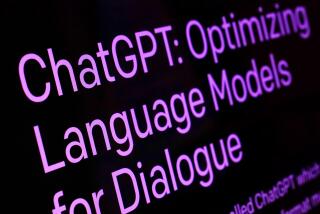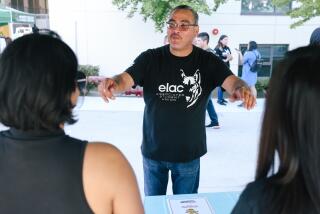It Can Be Hard to Connect in Online Class
- Share via
About two years ago, I registered for my first online writing class with UCLA Extension. An erratic work schedule made regular classes difficult, so online learning seemed an ideal solution.
How convenient to be able to take a class in the late hours of the night. I pictured myself crafting the great Korean American novel in my pajamas.
It didn’t work out like that.
I have signed up for six classes but finished only four. Both times I dropped out of classes, it was because I failed to connect with the teacher.
It’s odd how, as in a real classroom, one can automatically feel a connection to the teacher, even without meeting in person. But the facelessness of a classroom has its disadvantages. There’s something to be said about human contact when writing. There’s no replacement for seeing people getting excited, sad or perturbed about something one has written. And even reading out loud in a class offers more depth to a story.
The setup of UCLA’s online classes is fairly simple. Go to https://www.onlinelearning.net, and sign on to a personal page. The class communicates through the posting of lectures and assignments. The postings are similar to e-mail and are supposed to follow the same rules of etiquette. The school suggests logging on three to five times a week and spending about eight to 15 hours a week on assignments.
There also are chat rooms.
The concept of the virtual classroom is global. My instructors have been from the Midwest and East Coast. One teacher lived in Montana and would sign on, go fishing and then check up on his students again. There was a student who logged on from New Zealand. A 90-year-old widower, who lost his wife of 60 years, was writing to cope with the pain. And there was a nun who once worked for Mother Theresa. She told the class not to feel uncomfortable writing about sex or using profanities.
The most recent class was a virtual soap opera. Guaranteed anonymity offers a curious state of freedom. In the virtual classroom, students lower their walls and feel brave enough to say things they might not normally. A gay doctor from Florida said he would not have shared his poignant love story if we had been in a normal classroom.
I posted a story I had written in college. It started out as an essay and turned into what I thought was a light, humorous piece about growing up. One student, a psychologist, had no qualms about attacking the story: “I was turned off by Patty right away.” The psychologist was not gracious, humble or open-minded, which were part of the posted guidelines. I felt dejected. That character she didn’t like was me.
The doctor noticed her biting criticism as well and e-mailed an encouraging note to tell me to keep my spirits up.
The psychologist, however, was showered with praise for her piece on child abuse. Send it to the New Yorker. This story is like a song. But amid the sea of homage, there was one student who didn’t like it and flat out said so. He shredded it, calling it uninteresting and a cheap way to grab someone’s attention. I didn’t care for the psychologist’s story either. But trying to respect the writer’s work as objectively as possible, I thought it would be better if I didn’t comment.
The instructor, a former editor of a literary magazine, just sat back and watched. She seemed to be amused by all the backlash. She didn’t offer the constructive feedback I was used to, but rather made brief comments here and there. The teacher allowed the students to do most of the critiquing, thus steering the class into the students’ hands. The psychologist posted a long-winded lecture from a past class, informing us that all of our stories lacked plot.
The doctor too was troubled by the viciousness of the class. On the verge of dropping out, he decided to write a brutal yet honest satire about our class. The piece stung. His story, of course, roused up more melodrama. One angry student in New York insulted his integrity, his job, his existence as a writer. Someone else called it juvenile.
The psychologist said there was no plot.
Despite all these classes, I still have just one chapter of that great Korean American novel. I’ve decided to go on hiatus from virtual learning. My friends tell me true writers don’t need classes--they just need to write.
*
Eunice Park is a copy editor at The Times.
More to Read
Sign up for Essential California
The most important California stories and recommendations in your inbox every morning.
You may occasionally receive promotional content from the Los Angeles Times.













